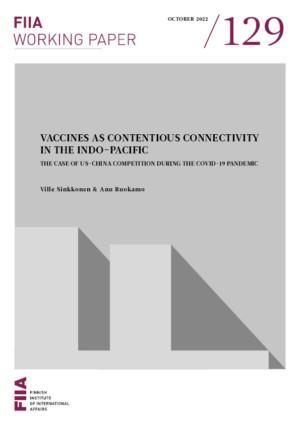This FIIA Working Paper explores the implications of contentious Covid-19 vaccine connectivity between the great powers for the future of regional connectivity and order maintenance in the Indo-Pacific. Utilising a connectivity-based analytical framework, it explores the vaccine forays of China, on the one hand, and the United States and its Quad partners, on the other, as well as the reactions of vaccine receiving countries.
The paper illustrates how the US and its partners, relying on a multilaterally-informed donations-based approach coupled with vaccines produced by Western manufacturers, have eventually managed to erode China’s first-mover advantage in using vaccines as a means of enhancing regional influence. Moreover, the great-power contest has allowed vaccine receiving countries to practise hedging, and ultimately created the possibility of switching to Western vaccine providers amidst fears over the lower effectiveness of Chinese vaccines and China’s bilateral sales-based approach to vaccine provision. More generally, the vaccine case illustrates the tragic consequences of worsening great-power relations for the provision of global public goods, as well as sustainable regional and international order.



